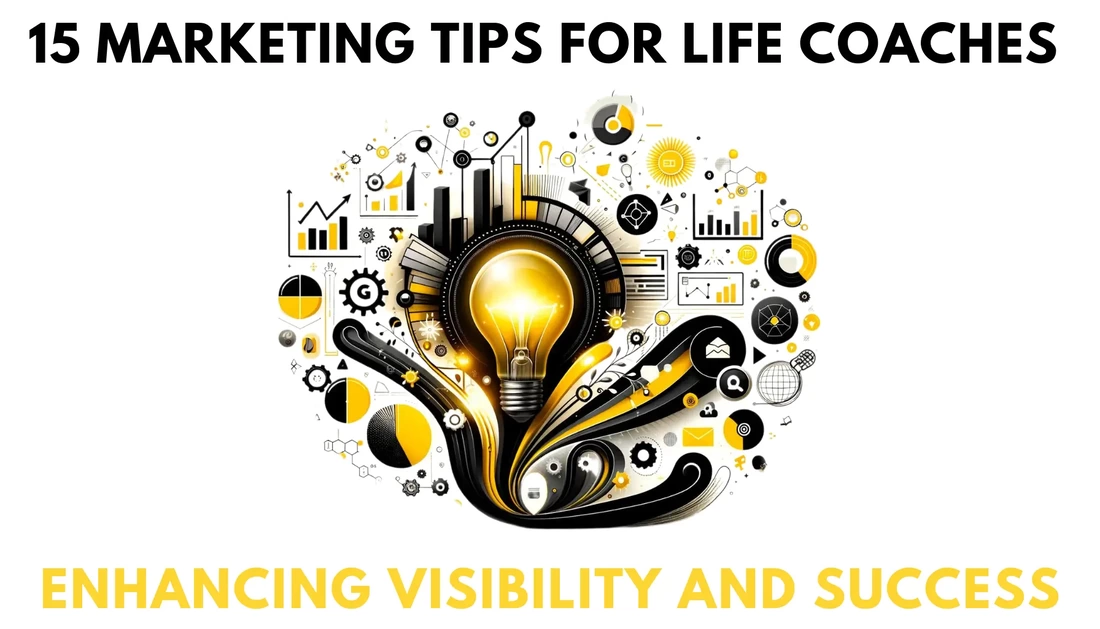15 Marketing Tips for Life Coaches: Enhancing Visibility and SuccessThe realm of life coaching is intensely competitive and rapidly evolving. Effective marketing isn't just about selling your services; it's about genuinely connecting with people who can benefit from your expertise. In today's digital age, where approximately 60% of the global population is online (based on assumed statistics similar to those from the Digital 2023 Global Overview Report), a robust online presence is more crucial than ever. This article will explore a variety of marketing strategies, focusing on how life coaches can not only reach potential clients but also impact lives positively. 1. Understanding the Market for Life CoachesIdentifying Your Target Audience Identifying your target audience is foundational in any marketing strategy. For life coaches, this means understanding the specific demographics, challenges, and aspirations of their ideal clients. For instance, if your coaching focuses on career advancement, your target audience might include professionals aged 25-40. Understanding this group's characteristics, such as their online behavior, preferences, and professional challenges, can guide your marketing efforts. Tailoring your message to resonate with this audience can significantly enhance the effectiveness of your marketing. Analyzing Market Trends and Client Needs Staying attuned to market trends and client needs is vital for relevance and growth. For example, a recent survey may suggest that 70% of professionals seek career coaching to navigate workplace challenges. Keeping abreast of such trends and aligning your services accordingly can help you meet the evolving needs of your clients. This ongoing analysis not only informs your service offerings but also shapes your marketing messages to address the current issues your clients face. 2. Digital Marketing for CoachesEmbracing Social Media Platforms Social media's influence is undeniable, with platforms like Facebook and LinkedIn boasting billions of active users. For life coaches, these platforms offer a wealth of opportunities to connect with potential clients. Sharing insightful content, engaging in community discussions, and leveraging targeted advertising can help establish your brand in these digital spaces. For instance, LinkedIn is an excellent platform for professional networking, while Instagram can be more effective for building a personal brand narrative. Social media marketing is an essential part of digital marketing for coaches. Website Optimization for Coaches Your website often forms the first impression for potential clients. An optimized website should be user-friendly, mobile-responsive, and quick to load, as statistics show that over 50% of web traffic comes from mobile devices. Additionally, clear calls to action and easy navigation can significantly improve user experience, encouraging visitors to explore your coaching services further. Integrating SEO best practices ensures that your site ranks higher in search engine results, making it more visible to your target audience. Email Marketing Strategies Despite the rise of social media, email marketing remains a highly effective tool for engaging with clients. Personalized email campaigns can have open rates as high as 20-30%. Regular newsletters, updates, and valuable content can nurture your relationship with your audience. Segmenting your email list based on client interests and engagement levels can further enhance the effectiveness of your campaigns, ensuring that your messages are relevant and engaging. 3. Branding and PositioningDeveloping a Unique Coaching Brand Creating a unique brand is crucial in the crowded life coaching market. Your brand should encapsulate your coaching philosophy, your approach to client transformation, and what sets you apart from other coaches. This might involve a particular coaching methodology, a focus on specific client outcomes, or a unique personal story. A well-crafted brand resonates with your target audience and can be a deciding factor for clients choosing your services. Effective Positioning in the Coaching Market Effective market positioning requires a deep understanding of your unique selling points and clearly communicating them to your target audience. For example, if your coaching practice specializes in executive leadership, your positioning should highlight your expertise in this area, perhaps backed by years of experience or a track record of successful client outcomes. Clearly articulating how your coaching addresses specific needs or challenges of your target audience can set you apart in the market. 4. Content Marketing & SEOCrafting Engaging Content Content marketing revolves around creating and distributing valuable, relevant, and consistent content to attract and retain a clearly defined audience. For life coaches, this might include blog posts, e-books, podcasts, or video content that provides insights into personal development, career growth, or wellness. For instance, a blog post titled "5 Strategies for Achieving Work-Life Balance" can attract individuals struggling with these challenges. Engaging content establishes your authority and builds trust with your audience. Whatever content you create, make sure it's part of an overall content marketing strategy. SEO Techniques for Coaches Search Engine Optimization (SEO) is crucial for making your online content more visible and rankable by search engines. Implementing SEO strategies might involve using relevant keywords in your content, optimizing meta descriptions, and ensuring your website's structure is search engine friendly. For instance, if "career coaching" is a key service you offer, incorporating this keyword strategically in your website's content can improve your visibility in search results related to career coaching. Utilizing Blogging and Articles Blogging is a powerful tool for sharing your expertise and insights in the life coaching field. Regularly updated blogs with high-quality content can improve your website's SEO, driving more traffic to your site. Additionally, sharing these blog posts on social media platforms can increase their reach and engage a broader audience. Blogging not only helps in attracting new clients but also provides existing clients with ongoing value and insights. 5. Networking and PartnershipsBuilding Professional Networks Professional networking is more than just attending events; it's about building meaningful relationships within and beyond your industry. Engaging with other professionals in related fields, such as therapists, nutritionists, or career counselors, can provide opportunities for collaboration and client referrals. For example, participating in a local business group or attending industry conferences can expose you to potential clients and partners who can enrich your coaching practice. Collaborations and Partnerships Collaborations can take various forms, such as guest blogging, co-hosting webinars, or developing joint programs. These partnerships can expand your reach, bringing new perspectives and value to your practice. Collaborating with a nutritionist, for example, could lead to a holistic wellness program that appeals to a wider audience. Such collaborations not only broaden your client base but also enhance your service offerings. 6. Client Engagement and RetentionEnhancing Client Relationships Building and maintaining strong relationships with clients is crucial for long-term success. This involves understanding and anticipating your clients' needs, providing personalized coaching experiences, and maintaining regular communication. For instance, sending personalized progress reports or check-in emails can show clients that you are invested in their journey, leading to higher satisfaction and engagement. Strategies for Client Retention Effective client retention strategies are key to maintaining a stable and loyal client base. This might include offering follow-up sessions, creating client appreciation programs, or providing additional resources and support between sessions. For example, a loyalty program offering discounts on future sessions or referrals can encourage clients to continue their coaching journey with you. 7. Utilizing Testimonials and ReviewsThe Power of Client Testimonials Client testimonials are powerful endorsements of your services and provide social proof to prospective clients. Positive testimonials, especially those highlighting specific outcomes or transformations achieved through your coaching, can greatly influence potential clients' decisions. Encouraging satisfied clients to share their experiences on your website or social media can enhance your credibility and attract new clients. Managing Online Reviews Online reviews can significantly impact your reputation. Actively managing your online presence, including encouraging satisfied clients to leave positive reviews and professionally addressing any negative feedback, is essential. Responding promptly and constructively to reviews shows prospective clients that you value feedback and are committed to client satisfaction. 8. Leveraging Public Speaking and WorkshopsPublic Speaking Opportunities Public speaking can significantly elevate your profile as a life coach. It allows you to reach a larger audience, establish credibility, and share your expertise on a broader platform. Whether it's speaking at industry conferences, local events, or online webinars, public speaking opportunities can increase your visibility and attract potential clients. Conducting Workshops and Seminars Workshops and seminars provide an interactive platform to demonstrate your expertise and engage directly with potential clients. These events can be focused on specific topics, such as stress management or career development, offering attendees practical insights and strategies. Conducting workshops not only showcases your knowledge but also provides a taste of your coaching style to potential clients. 9. Paid Advertising and PromotionsExploring Paid Advertising Avenues Understanding and utilizing paid advertising can enhance the reach of your coaching practice. This could involve Google Ads, social media advertising, or sponsored content. For instance, targeted Facebook ads can reach specific demographics, interests, or geographic locations, making your advertising efforts more efficient and effective. Effective Promotion Techniques Effective promotion techniques are varied and should align with your brand and target audience. This might include offering free initial consultations, hosting webinars, or creating time-limited offers. Tailoring your promotions to the interests and needs of your target audience can increase engagement and attract new clients. 10. Personal Development and Continuous LearningInvesting in Self-Growth As a coach, your personal growth and development are essential. Investing in your own learning, whether through additional certifications, attending workshops, or engaging in self-reflection practices, demonstrates your commitment to your profession. Continuous learning ensures that you bring fresh perspectives and updated skills to your coaching practice. It's also a great opportunity to meet like minded people and extend your network. 11. Measuring and Analyzing Marketing SuccessTools for Measuring Marketing Impact Using the right tools to measure the impact of your marketing efforts is a cornerstone of successful strategies. Tools like Google Analytics offer insights into website traffic, user behavior, and conversion rates, enabling life coaches to understand how visitors interact with their content. Similarly, social media platforms provide detailed analytics on engagement and reach, allowing coaches to measure the effectiveness of their social media campaigns. Surveys and feedback forms are equally important; they provide direct input from clients about what is resonating with them. For instance, HubSpot's State of Marketing Report shows that 75% of marketers are using their reports to show how campaigns are directly impacting revenue. Adapting Strategies Based on Analysis The ability to adapt based on data analysis is crucial. This agility in marketing means evaluating what strategies are working and which aren't, then pivoting accordingly. For example, if analytics show that certain blog topics drive more traffic than others, a life coach might focus on those topics more. This dynamic approach ensures that marketing efforts are not static but evolve with changing patterns and preferences. Adobe's Digital Trends Report highlights that top-performing companies are more than twice as likely to be using AI for marketing, showing the value of data-driven decision-making. 12. Overcoming Marketing ChallengesAddressing Common Marketing Pitfalls One common pitfall for life coaches in marketing is not adequately defining their target audience, which can lead to generalized and ineffective marketing strategies. Another challenge is failing to keep up with the latest digital marketing trends. Understanding these challenges is the first step in developing strategies to overcome them. Innovative Solutions for Marketing Obstacles Innovation in marketing involves creative problem-solving. This could mean leveraging emerging technologies like virtual reality (AR) for immersive coaching experiences or using storytelling techniques to create more engaging and relatable content. As per the Content Marketing Institute, 70% of B2B marketers are creating more content than a year ago, indicating the importance of innovative content strategies. With so many potential channels and strategies, it can be overwhelming. Leaning on a professional agency that specialized in digital marketing for coaches, can give you an important competitive advantage. 13. Consistency and Perseverance in MarketingStaying the Course Consistency is key in any successful marketing strategy, including for coaches. It's about maintaining a steady presence, whether through regular social media posts, blog updates, or email newsletters. This consistent engagement helps build a loyal audience over time and establishes your brand as a reliable source in the coaching field. You are not going to create a scalable and successful business overnight. Be patient. Be consistent. Overcoming Challenges Without Giving Up The journey of marketing is often filled with challenges and learning curves. It's important to view these as growth opportunities rather than setbacks. Persistence in refining your strategies, even when results aren't immediate, is crucial. Remember, the most successful marketing campaigns are those that evolve through perseverance and adaptability. 14. Embracing a Growth Hacking ApproachInnovative Strategies for Rapid Growth Growth hacking is all about finding creative, low-cost strategies to significantly grow your business and enhance engagement. For life coaches, this could mean leveraging viral marketing techniques, collaborating with influencers in the coaching niche, or implementing unconventional digital campaigns that captivate and intrigue your target audience. Data-Driven Decisions for Impactful Results At its core, growth hacking is deeply rooted in data analysis and continuous experimentation. By closely monitoring the performance of your marketing activities and being willing to quickly pivot based on what the data reveals, you can identify the most effective ways to reach and resonate with your audience, leading to faster growth and a stronger online presence. 15. The Future of Marketing for CoachesEmerging Trends in Coaching Marketing Staying ahead of emerging trends is essential for life coaches looking to maintain a competitive edge. This includes embracing new platforms like TikTok for younger demographics or utilizing voice search optimization. Understanding these trends and incorporating them into marketing strategies can be a game-changer. Preparing for Future Marketing Shifts Adaptability in marketing strategies is vital for long-term success. This means staying informed about changes in digital marketing and being ready to pivot strategies in response to new consumer behaviors or technological advancements. A forward-thinking approach involves continuous learning and being open to experimenting with new marketing channels and tactics. Conclusion In conclusion, effective marketing for life coaches involves a combination of data-driven strategies, adaptability, innovation, and staying abreast of emerging trends. By employing these 15 strategies, life coaches can enhance their visibility, connect with more clients, and achieve greater success. Remember, you're not just promoting a service; you're offering a transformational experience that can enrich lives. If you're looking to elevate your marketing efforts and truly make your mark in the coaching world, don't hesitate to seek expert guidance. Visit Bottomline Agency's Digital Marketing Services for Coaches to explore a range of tailored solutions designed to amplify your presence and propel your coaching business to new heights. Let's embark on this journey together, crafting a narrative that resonates with your audience and turns your vision into reality. Your success story starts here. Coach Marketing FAQWhat are the key elements of a successful coaching website?
A successful coaching website should be user-friendly, mobile-responsive, and visually appealing. It should clearly articulate the coach's services, expertise, and unique value proposition. Including client testimonials, a blog section, and clear calls-to-action (CTAs) are also crucial. An effective website not only informs visitors but also encourages them to take the next step in their coaching journey. How can life coaches measure the success of their marketing efforts? Life coaches can measure the success of their marketing efforts through various metrics such as website traffic, conversion rates, social media engagement, and client feedback. Tools like Google Analytics can track website performance, while social media insights provide data on post engagement and audience growth. Regular surveys and client feedback forms can also provide valuable insights into the effectiveness of different marketing strategies. What strategies can life coaches use to retain clients? To retain clients, life coaches should focus on building strong, ongoing relationships. This can be achieved through regular check-ins, personalized coaching sessions, and providing additional resources like webinars or e-books. Creating a community for clients, such as a Facebook group or forum, can also foster a sense of belonging and ongoing support. How can life coaches stay current with marketing trends? Staying current with marketing trends involves continuous learning and adaptability. Life coaches can subscribe to marketing newsletters, attend industry webinars, and participate in relevant online forums. Networking with other professionals in the field and experimenting with new marketing tactics and tools can also help stay abreast of the latest trends. Have more questions? Book a free coach marketing consultation or see more frequently asked questions!
0 Comments
Leave a Reply. |
AuthorsAll blog entries are written by Bottom Line Marketing team members and guest bloggers. Archives
June 2024
Categories
All
|
|
Bottom Line - Cayman Marketing Agency
16 Sunrise Blvd, George Town, Cayman Islands
Marketing Blog |
DIGITAL MARKETING SERVICES
|
SPECIALTIES |
Follow Us
|
© COPYRIGHT 2024. ALL RIGHTS RESERVED | PRIVACY POLICY & TERMS AND CONDITIONS.







 RSS Feed
RSS Feed
